Home Tags Posts tagged with "Saudi Arabia"
Saudi Arabia
A Saudi royal member, who murdered a fellow Saudi, may be executed, a newspaper reported on Sunday, in a rare example of a member of the kingdom’s ruling family facing the death penalty.
The English-language Arab News did not name the prince or his victim, but said a senior member of the family and government, Crown Prince Salman bin Abdulaziz al Saud, had “cleared the way for the possible execution of a prince convicted of murdering a Saudi citizen”.
In a message about the case to Interior Minister Prince Mohammed bin Nayef, Prince Salman said: “Sharia [Islamic law] shall be applied to all without exception.”
Prince Salman’s message followed a statement from the victim’s father that he was not ready to pardon the killer and he was not happy with the amount offered as blood money.
The families of murder victims are encouraged by authorities to accept blood money instead of insisting on execution.

Crown Prince Salman bin Abdulaziz al Saud had cleared the way for the possible execution of a prince convicted of murdering a Saudi citizen
The paper quoted Crown Prince Salman’s message as saying: “There is no difference between big and small, rich and poor … Nobody is allowed to interfere with the judiciary’s decision. This is the tradition of this state. We are committed to following the sharia.”
The Arab News is part of a media group chaired by a son of Crown Prince Salman, who is also deputy PM and minister of defense.
The kingdom, which follows a strict version of sharia has been criticized in the West for its high number of executions, inconsistencies in the application of the law, and its use of public beheading to carry out death sentences.
Saudi Arabia had executed at least 47 people as of May 2013, according to Amnesty International’s website, compared to 82 in all of 2011 and a similar number in 2012.
Members of the ruling family are only rarely known to be executed. One of the most prominent cases was Faisal bin Musaid al Saud, who assassinated his uncle, King Faisal, in 1975.
The Saudi royal family is estimated to number several thousand. While members receive monthly stipends, and the most senior princes command great wealth and political power, only a few in the family hold nationally important government posts.
Lebanon’s army is to receive a $3 billion grant from Saudi Arabia.
Lebanese President Michel Sleiman made the announcement in a televised address after the funeral of a senior Lebanese politician killed in a car bomb attack. He said it would help fight terrorism.
Mohamad Chatah, a Sunni Muslim, was a staunch critic of Syrian President Bashar al-Assad and Lebanon’s Shia Hezbollah movement that backs him.
Saudi Arabia and Hezbollah have taken opposite sides in the Syrian conflict.
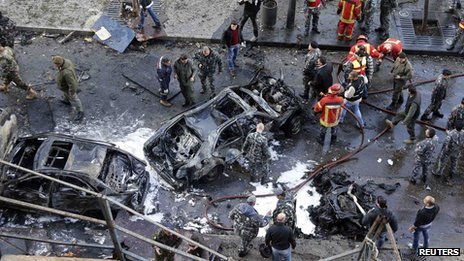
Mohamad Chatah was killed in a car bomb attack in Beirut
“The king of the brotherly Kingdom of Saudi Arabia is offering this generous and appreciated aid of $3 billion to the Lebanese army to strengthen its capabilities,” Michel Sleiman said in his address.
He said it was the largest assistance provided in Lebanon’s history and would be used to buy weapons from France.
French President Francois Hollande said his country would “meet” any demands for weapons from Lebanon during a visit on Sunday to Saudi Arabia aimed at boosting commercial ties with the kingdom.
“I am in touch with President Sleiman… If demands are made to us, we will meet them,” Francois Hollande said.
President Michel Sleiman said the Saudi aid would finally allow the Lebanese army to “confront terrorism” and put an end to the proliferation of arms.
Saudi campaigner Aziza al Yousef has been stopped by police as she was driving through Riyadh.
Aziza al Yousef is a leading campaigner for giving women the right to drive.
Photos of Aziza al Yousef were posted on Friday morning as she was seen at the wheel.
Her fellow activist, Eman al Nafjan, took the pictures.
On her Twitter page, Eman al Nafjan provided a running account of their drive, saying they bought a bunch of bananas without anyone batting an eyelid.
Eman al Nafjan posted a photo of them filling up at a petrol station and expressed her satisfaction that this all seemed to be treated as an everyday occurrence.
But then they were spotted and reported to the police, who stopped them.
Both were asked to sign a pledge that they would not drive again. Eman al Nafjan refused to.

Saudi campaigner Aziza al Yousef has been stopped by police as she was driving through Riyadh
On Twitter, while still with the police, she said that if she was asked to call her male guardian, she would simply say that she was her own guardian. But her guardian – known as a mahram – was called against her wishes.
The two women were then released. Eman al Nafjan described her companion as the bravest and most courageous of drivers. It was only two days ago that Aziza al Yousef – with another activist, Hala al-Dosari – had a meeting with the Interior Minister, Prince Mohammed bin Nayef.
The prince has long been one of the most powerful men in the country and is seen as a possible future king – representing a younger generation than the current leaders. Activists said the meeting was positive and the minister sympathetic.
No-one expected this to herald any big change in the immediate future. Reform is a gradual process in Saudi Arabia and there remain powerful factions opposed to lifting the driving ban on women.
But the meeting came after activists re-launched a campaign several months ago with the aim of making the idea of women driving in Saudi Arabia a normal part of life.
They originally set October 26 as a day for women – with the support of Saudi men – to take to the wheel. Dozens did, but the authorities made clear they would not accept a mass flouting of the ban.
Since then, activists have recast the campaign around the non-existent day of November 31 – a sign that it would continue indefinitely. Several women have been driving and posting videos of themselves since.
The meeting with Prince Mohammed bin Nayef had been seen as possibly offering fresh hope that the authorities might be taking a softer stance.
The brief detention of Aziza al Yousef and Eman al Nafjan is an abrupt reminder that nothing can be taken for granted in Saudi Arabia – and that a shift one way often only signals a shift in the exact opposite direction a few days later.
[youtube swLGx6fbM7E 650]
According to a poll of gender experts, Egypt is now the worst country for women’s rights in the Arab world.
The study found s**ual harassment, high rates of female genital mutilation and a growth in conservative Islamist groups contributed to the low ranking.
The Comoros islands came top in the survey, which was conducted by the Thomson Reuters Foundation.
The poll surveyed more than 330 gender experts in 21 Arab League states as well as Syria.
It is the foundation’s third annual study focusing on women’s rights since the Arab Uprisings in 2011.
Iraq ranked second-worst after Egypt, followed by Saudi Arabia, Syria and Yemen.
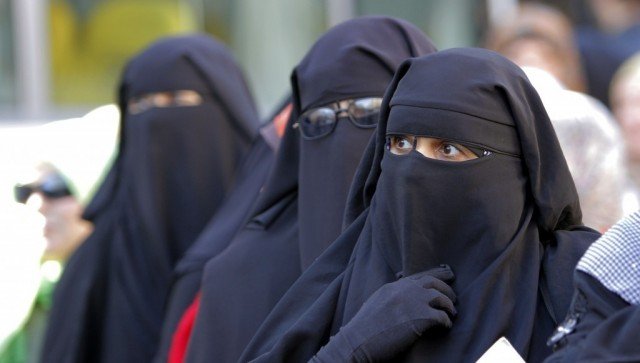
Egypt is now the worst country for women’s rights in the Arab world, according to a poll of gender experts
The Comoros, where women hold 20% of ministerial positions, is followed at the top of the rankings by Oman, Kuwait, Jordan and Qatar.
The poll asked experts to assess factors such as violence against women, reproductive rights, treatment of women within the family and women’s role in politics and the economy.
Discriminatory laws and a spike in trafficking contributed to Egypt’s place at the bottom of the ranking of 22 Arab states, the survey said.
“There are whole villages on the outskirts of Cairo and elsewhere where the bulk of economic activity is based on trafficking in women and forced marriages,” said Zahra Radwan of US-based rights group Global Fund for Women.
However, s**ual harassment was cited as the main factor.
A UN report in April said 99.3% of women and girls in Egypt had been subjected to s**ual harassment.
“The social acceptability of everyday s**ual harassment affects every woman in Egypt regardless of age, professional or socio-economic background, marriage status, dress or behavior,” said Noora Flinkman of Egyptian campaign group HarassMap.
Meanwhile, the survey said Iraq was now more dangerous for women than under Saddam Hussein, with women disproportionately affected by the violence of the past decade.
Saudi Arabia ranked poorly on women’s involvement in politics, workplace discrimination, freedom of movement and property rights.
However, the conservative country scored better than many other Arab states when it came to access to education and healthcare, reproductive rights and gender violence.
[youtube ewneLaauAKI 650]
Saudi Arabia’s government has stepped up warnings to women not to defy a ban on female drivers by taking part in a mass driving protest.
The interior ministry has reiterated that anyone flouting the ban is likely to face unspecified punishment.
Saturday’s planned protest is the third of its kind since 1990.
About 17,000 people signed a petition calling either for women to be allowed to drive or for an explanation of why the prohibition should remain in force.
Campaigners are encouraging women to take to the wheel in defiance of the ban.
After the 1990 protest, a number of women were arrested or lost their jobs.
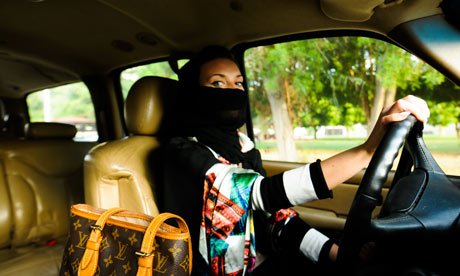
Saudi Arabia’s government has stepped up warnings to women not to defy a ban on female drivers by taking part in a mass driving protest
An interior ministry spokesman, Mansour al-Turki, considerably toughened the Saudi government line on the women drivers’ campaign on Thursday.
A previous statement on Wednesday was confusing, with both those pro- and anti- the campaign believing it favored them.
But Mansour al-Turki explicitly restated that women were prohibited from driving, with violators – and their supporters – likely to face unspecified measures.
A campaign activist, Zaki Safar, said that this was an unusually explicit statement of the ban, which is informal rather than enshrined in Saudi law.
Zaki Safar believes the government is still sending mixed messages, as it is itself divided over whether to lift the ban.
Earlier this week, about 100 conservative clerics asked for an audience at the royal court in the capital, Riyadh, to denounce the campaign as a conspiracy by women and a threat to the country.
But there have been indications of a less hardline attitude by the authorities than back in 1990, and at the second protest in 2011.
As part of the latest campaign, dozens of women have posted online videos of themselves driving in different Saudi cities. None of them has been arrested.
The activists behind the campaign believe the public mood is changing, with many more people – including an increasing number of men – publicly supporting the lifting of the ban.
[youtube IE2exF74lfQ 650]
Saudi Arabia has rejected a non-permanent seat on the UN Security Council, accusing the world body of “double standards”.
The Saudi foreign ministry said the UN needs to be reformed first.
It said the Security Council had failed in its duties towards Syria as well as in other world conflicts.
Saudi Arabia has previously expressed frustration at what it sees as an international failure to act on Syria, where it staunchly backs the rebels.
There has been no official reaction from the UN, but diplomats there expressed surprise at Riyadh’s announcement.
Russia’s foreign ministry called the move bewildering, and said Saudi Arabia’s criticism of the UN Security Council about its actions over Syria “is particularly strange”.
The announcement came hours after Saudi Arabia was elected for the first time to one of the 10 rotating seats on the Security Council.

Saudi Arabia has rejected a non-permanent seat on the UN Security Council
The non-permanent members sit on the council for two years, along with the five permanent members – the US, the UK, France, China and Russia.
“Work mechanisms and double-standards on the Security Council prevent it from carrying out its duties and assuming its responsibilities in keeping world peace,” the Saudi foreign ministry said in a statement.
“Therefore Saudi Arabia… has no other option but to turn down Security Council membership until it is reformed and given the means to accomplish its duties and assume its responsibilities in preserving the world’s peace and security,” it added.
The failure “to find a solution to the Palestinian cause for 65 years” had led to “numerous wars that have threatened world peace,” the foreign ministry said.
Saudi Arabia also criticized the UN’s “failure” to rid the Middle East region of weapons of mass destruction, including nuclear weapons.
It also accused the UN of allowing the Syrian government “to kill its own people with chemical weapons… without confronting it or imposing any deterrent sanctions”.
The UN Security Council last month finally broke a two-and-a-half year deadlock on how to deal with conflict in Syria after voting unanimously to adopt a binding resolution on ridding the country of chemical weapons.
Saudi observers say Riyadh would have been working for years to gain a place on the UN Security Council, so such a decision would have to have been made at the very top of the kingdom’s leadership.
One Security Council diplomat, quoted by AFP, said the announcement was “totally unexpected” and without precedent.
[youtbe mIxwcTIlXXA 650]
[youtube skI0cHYjCQk 650]
Saudi Princess Meshael Alayban has been arrested in California and accused of human trafficking.
Meshael Alayban, 42, is accused of forcing a Kenyan woman to work 16 hours a day while paying her far less than what she was originally promised.
Authorities say Meshael Alayban took the woman’s passport, precluding her escape. Her lawyer called the case a dispute over work hours.
In November, California voters toughened human trafficking penalties.
If convicted, Meshael Alayban faces a maximum sentence of 12 years in prison, double the punishment prescribed before voters approved the law known as Proposition 35.
Prosecutors say she is one of six wives of Prince Abdulrahman bin Nasser bin Abdulaziz al-Saud, a scion of the Saudi royal family.
The unnamed Kenyan woman had begun working for Meshael Alayban last year in Saudi Arabia under a two-year contract with an employment agency.
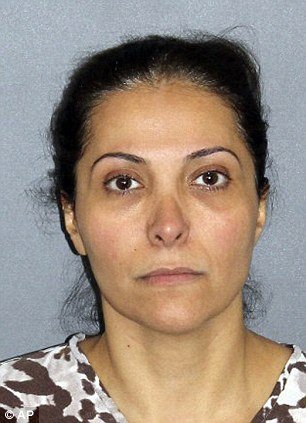
Meshael Alayban, 42, is accused of forcing a Kenyan woman to work 16 hours a day while paying her far less than what she was originally promised
That contract guaranteed her $1,600 a month for eight-hour work days, five days a week, California officials said. Instead she was paid $220 a month and forced to work twice as long, according to prosecutors.
The 30-year-old Kenyan woman also alleges her passport was taken from her when she arrived in Saudi Arabia. It was only returned to her long enough for her to travel to the US with Meshael Alayban.
In California, she said she was forced to perform household chores for at least eight people in four units at the same block of flats where she was allegedly held captive. When she managed to escape, she flagged down a bus driver and later went to police.
Meshael Alayban was arrested on Wednesday.
“My client was a slave to this woman,” said Steve Barick, a lawyer for the accuser.
“She wasn’t able to freely move about. She had her ability to move in and about the country taken away. She was intimidated. She was promised one thing when she was in another country and when she was brought here that was changed. She was overworked. She was underpaid.”
Orange County District Attorney Tony Rackauckas described the accuser’s situation as “an example of forced labor.”
“It’s been 150 years since the Emancipation Proclamation, so slavery has been illegal in the United States and certainly in California all this time,” he said.
“It’s disappointing to see it in use here.”
Meshael Alayban did not enter a plea in her first court appearance on Thursday. She was released on $5 million bail shortly after the hearing but was ordered to surrender her passport and to wear a GPS tracking device.
Prosecutors had asked a judge for bail to be set at $20 million or denied entirely, given Meshael Alayban’s wealth.
[youtube o0DZndZVHA8]
A Saudi court has sentenced seven cyber activists to between five to 10 years in prison for inciting protests, mainly by using Facebook.
The men were arrested in September last year, according to Human Rights Watch (HRW), and their trial began in April.
The activists were charged with posting online messages to encourage protests in Saudi Arabia, although they were not accused of directly taking part in demonstrations.
It is seen as the country’s latest move against online political dissent.
The New York-based rights group HRW said the case was heard in an anti-terrorism court.
The longest sentence of 10 years was reportedly given to an activist who set up two Facebook groups allegedly explaining the best protest techniques.
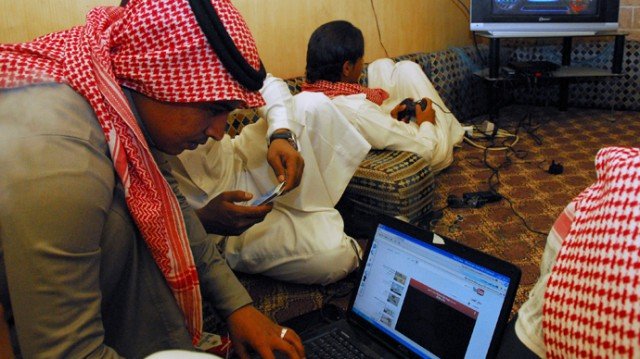
A Saudi court has sentenced seven cyber activists to between five to 10 years in prison for inciting protests, mainly by using Facebook
The rights group said the men had all admitted contributing to Facebook pages supporting the leading Shia cleric Tawfiq al-Amer, who was held in February 2011 after calling for a constitutional monarchy.
His arrest provoked anti-government rallies inspired by a wave of popular revolt in the country’s Eastern Region, where much of its crude oil is sourced.
The seven men were sentenced on June 24 for “allegedly inciting protests and harming public order, largely by using Facebook”, HRW said.
The court also barred them from travelling for additional periods.
Several of the defendants said they had been tortured into signing confessions, according to HRW.
The case contained two elements that the Saudi authorities are particularly sensitive about – political criticism expressed online and protests staged by the Shia minority in the east of the country.
Several Saudi human rights campaigners have recently been imprisoned. Two women were jailed earlier in June for allegedly inciting a woman against her husband, after they tried to help a Canadian who had complained of abuse by her Saudi husband.
HRW urged European Union officials to condemn the latest convictions ahead of a meeting with Gulf leaders on Sunday.
“Sending people off to years in prison for peaceful Facebook posts sends a strong message that there’s no safe way to speak out in Saudi Arabia, even on online social networks,” Joe Stork, HRW’s deputy Middle East director, said.
Prince Alwaleed Bin Talal of Saudi Arabia has defended his decision to sue the business magazine Forbes.
The billionaire is seeking damages over what he claims were “seriously defamatory comments” made about him.
In March, Forbes calculated Prince Alwaleed’s fortune to be $20 billion, placing him 26th on the magazine’s Rich List.
The 58-year-old disputed the methodology used and said Forbes had “insulted” the business community in Saudi Arabia.
Prince Alwaleed has previously said that the magazine underestimated his fortune by $9.6 billion.
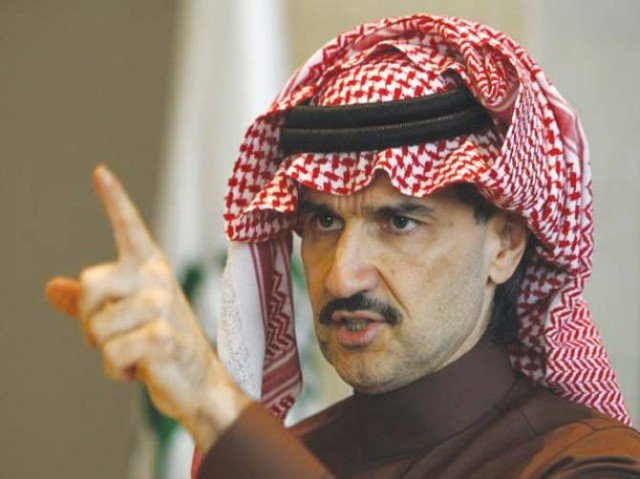
Prince Alwaleed Bin Talal of Saudi Arabia has defended his decision to sue the business magazine Forbes
However, in a statement, Prince Alwaleed’s investment vehicle, Kingdom Holding Company, said the libel action was not about his ranking on the Forbes Rich List, but about “correcting the seriously defamatory comments that have been made about HRH Prince Alwaleed as an individual and Kingdom Holding Company”.
The case has been filed in a London court.
Kingdom Holding Company owns stakes in Rupert Murdoch’s News Corporation and London’s Savoy Hotel.
Prince Alwaleed also accused Forbes of publishing a “deliberately insulting and inaccurate description of the business community in Saudi Arabia and specifically, Forbes‘ denigration of the Saudi stock exchange (Tadawul), which is one of the most regulated in the world”.
In the Forbes article, a former executive with Prince Alwaleed’s company is quoted as describing the Saudi Stock Exchange as a place of gambling.
In calculating his wealth, Forbes said it valued the underlying investments of Kingdom Holding Company, rather than the shares listed on the Saudi Stock Exchange.
This, according to Prince Alwaleed, was an “irrational and deeply flawed valuation methodology, which is ultimately subjective and discriminatory”.
In a statement, Forbes said it is “bemused by Prince Alwaleed’s ego-driven PR stunt”.
New reports reveal Saudi Arabia sent a written warning about Tamerlan Tsarnaev to the U.S. Department of Homeland Security in 2012, long before Boston Marathon blasts, according to a senior Saudi government official with direct knowledge of the document.
It appears the Saudi warning came separately from the multiple red flags raised by Russian intelligence in 2011, and was based on human intelligence developed independently in Yemen.
Citing security concerns, the Saudi government also denied an entry visa to Tamerlan Tsarnaev in December 2011, when he intended to make a pilgrimage to Mecca, the source said.
Tamerlan Tsarnaev’s plans to visit Saudi Arabia have not been previously disclosed.
The Saudis’ warning to the U.S. government was also shared with the British government and it “did name Tamerlan specifically”, according to the source.
“It was very specific” and warned that “something was going to happen in a major U.S. city”. The document did not name Boston or suggest a date for his planned attack.
If true, the account will produce added pressure on the Homeland Security department and the White House to explain their collective inaction after similar warnings were offered about Tamerlan Tsarnaev by the Russian government.
A DHS official denied, however, that the agency received any such warning from Saudi intelligence about Tamerlan Tsarnaev.
And so the White House: “We and other relevant U.S. government agencies have no record of such a letter being received,” said Caitlin Hayden, a spokesperson for the president’s National Security Council.
The letter likely came to DHS via the Saudi Ministry of Interior, the agency tasked with protecting the Saudi kingdom’s homeland.
However, a Homeland Security official confirmed Tuesday evening on the condition of anonymity that the 2012 letter exists.
Meanwhile, House Homeland Security Committee chairman Mike McCaul plans to announce on Wednesday an investigative hearing to probe what U.S. intelligence knew prior to the Boston attacks.
Separately, President Barack Obama announced Tuesday that the U.S. government will launch a wide-ranging inquiry into the sharing of information among the Federal Bureau of Investigation, the Department of Homeland Security and other intelligence and law-enforcement agencies of the federal government.
The internal review will be led by Director of National Intelligence James Clapper and several inspectors general.
It is not yet clear whether information from Saudi Arabia will be involved in James Clapper’s inter-agency review.

Saudi Arabia sent a written warning about Tamerlan Tsarnaev to the U.S. Department of Homeland Security in 2012, long before Boston Marathon blasts
It appears the Saudi government alerted the U.S. in part because it believed American authorities should be inspecting packages that came to Tamerlan Tsarnaev in the mail in order to search for bomb-making components.
The written warning also allegedly named three Pakistanis who may be of interest to British authorities. The official declined to provide more details about the warning to the UK, but said the two governments received the same information.
The Ministry of Interior, he said, sent the letters in 2012, likely after Tamerlan Tsarnaev returned from Russia to the US in July.
President Barack Obama’s published schedule indicates that he met in the Oval Office with Prince Mohammed bin Naif bin Abdulaziz, the Saudi Interior minister, on January 14, 2013.
The Saudis denied Tamerlan Tsarnaev entry to the kingdom when he sought to travel to Mecca in December 2011 for a pilgrimage known as an Umrah – one that is undertaken during months that don’t fall within the regular Hajj period of the year.
That rejected application came one month before he traveled to Russia, where U.S. intelligence sources believe he acquired training enabling him to construct and detonate the bombs that he and his younger brother Dzhokhar placed hear the Boston Marathon’s finish line.
Dzhokhar Tsarnaev, 19, is in federal custody at a prison medical facility.
The Saudi official speculated that Tamerlan Tsarnaev’s residence in the US might have made it more difficult for him to gain entry into the kingdom.
“U.S.-based Muslims who become radicalized and want to visit Mecca create an unusual problem,” he said, compelling the Saudi government “to carefully examine applications”.
In the wake of the April 15 Boston Marathon bombings, Saudi Foreign Minister Prince Saud al-Faisal met with Secretary of State John Kerry on April 16, and then had an unscheduled meeting with President Barack Obama on April 17.
“This is the DNA of the Saudi government,” said the Saudi official, referring to officials in the royal court in Riyadh.
“This is how they work. They sent the letter, but that wasn’t enough. They then sent the top guy to meet personally with the president.”
The Saudi official dismissed the idea that Tamerlan Tsarnaev was likely trained by al-Qaeda while he was outside the US last year.
The Saudis’ Yemen-based sources, he explained, said militants referred to Tamerlan dismissively as “the volunteer”.
“He was a gung-ho, self motivated jihadi who wasn’t tasked by a larger group,” he said.
“There is no reason for anyone in Afghanistan to have in his thinking a scenario like this.
“He took the initiative. That’s why they call him <<the volunteer>>.”
“The Boston thing is beneath them,” he said of al Qaeda.
“They don’t think like this. This is like a firecracker to them. They want something big.”
Tamerlan Tsarnaev may have boasted about his plans online, the Saudi official said, offering an explanation for how Yemen-based sources first learned of him. Islamist militants have well-developed social networks that can enable news to migrate quickly across vast distances.
The Saudi government sometimes tracks such radicals by launching fake jihadi websites to attract extremists. The Ministry of Interior then tracks them electronically, often across the world, and shares information with governments it considers friendly, including the US.
The Saudi intelligence services have a long history of providing credible information to America and Great Britain about looming threats.
“This is the fourth time the Saudi Arabian government has given the U.S. specific intel” about a possible terror plot, the official said, citing prior warnings about Richard Reid, the so-called shoe bomber who repeatedly tried to light a fuse in his shoe to bring down American Airlines flight 63 bound for Miami in December 2001.
He also cited the 300-gram “ink-cartridge bombs” planted on two cargo planes headed for the US from Yemen in October 2010. Those explosives were intercepted in Dubai, and at an East Midlands airport in Great Britain.
Tamerlan Tsarnaev’s namesake was a 15-century Central Asian warlord who referred to himself as “the sword of Islam”. Sometimes spelled “Tamerlane” in English, he was known for his cruelty.
When he conquered Baghdad, Tamerlane reportedly made a pyramid of human skulls from unfortunate residents of that city.
Although still revered in Chechnya and throughout Central Asia, the original Tamerlane is sometimes vilified in modern-day Saudi textbooks.
Saudi Arabia’s Prince Alwaleed Bin Talal has accused Forbes magazine of understating his wealth.
In Forbes 2013 list of the world’s richest people, the magazine estimated Prince Alwaleed Bin Talal’s net worth at $20 billion, putting him in 26th place.
According to reports, the prince estimates his net worth to be $29.6 billionn, which would put him in the top 10.
Forbes said it had examined the prince’s wealth “deeply” following claims he had exaggerated his fortune.
In an article published on its website, Forbes also said that the prince often went to great lengths to affect his ranking and had complained in previous years about the valuation Forbes had put on his wealth.
“Of the 1,426 billionaires on our list, not one – not even the vainglorious Donald Trump – goes to greater measure to try to affect his or her ranking,” Forbes magazine claimed.
Citing former associates of Prince Alwaleed Bin Talal, the magazine said his ranking was very important to the prince.
“This is how he wants the world to judge his success or his stature,” an anonymous source was quoted as saying.
The list, published on Monday, saw Mexico’s Carlos Slim retain the top slot for the fourth straight year with a net worth of $73 billion.
The 10th spot on the list went to Bernard Arnault and family of the luxury goods group LVMH, with a net worth of $29 billion.

Saudi Arabia’s Prince Alwaleed Bin Talal has accused Forbes magazine of understating his wealth
Prince Alwaleed Bin Talal’s office claimed Forbes used flawed valuation methods that were “designed to disadvantage” Middle Eastern investors.
It alleged that Forbes had refused to accept the valuations of the stocks listed on Tadawul, the Saudi Arabian Stock Exchange, while it had accepted valuations of listings on other emerging markets such as the Mexican Stock Exchange.
It said that Forbes had applied “differing standards of proof for different individuals”.
The prince’s office said that it had requested Forbes to remove the prince from its rich list. It added that it had severed all ties with the magazine and would no longer co-operate with the valuation teams.
“We have worked very openly with the Forbes team over the years and have on multiple occasions pointed out problems with their methodology that need correction,” Shadi Sanbar, chief financial officer of Kingdom Holding Company, which the prince owns, said in a statement.
“However, after several years of our efforts to correct mistakes falling on deaf ears, we have decided that Forbes has no intention of improving the accuracy of their valuation of our holdings and we have made the decision to move on.”
Prince Alwaleed Bin Talal’s Kingdom Holding Company, whose shares are traded on the Saudi stock exchange, owns stakes in hotel groups including Four Seasons and Fairmont Raffles and is a part-owner of the Savoy Hotel in London.
The prince is a major investor in News Corporation and, according to Forbes, he bought a 3% stake in Twitter last year for $300 million.
The head of Saudi Arabia’s religious police has said there is a pressing need to employ more women in the force.
Speaking to the official Saudi Gazette newspaper, Abdul Latif Abdul Aziz al-Sheikh said he hoped a recruitment drive would take place soon.
Saudi’s religious police enforce the kingdom’s strict Islamic laws, including dress and prayer times.
Correspondents say the introduction of women could be a sign of the king’s cautiously reformist agenda.
Earlier this month, Abdul Latif Abdul Aziz al-Sheikh announced that he would curb the powers of the religious police, known as the “mutawa”.
He himself was appointed in January to deal with growing public anger about excessive behavior by the force.
Recently, a mobile phone clip of a religious policeman ordering a young woman to leave a mall because of her make-up went viral on the internet.
There is no indication that the introduction of women into the religious police would necessarily make the rules any less strict, but it would boost the presence of women in public life.
The sanctioned duties of the mutawa, officially known as the Commission for the Promotion of Virtue and Prevention of Vice, include preventing women driving, enforcing modest dress codes, policing bans on public entertainment and making sure all businesses close for prayers five times a day.
Although Saudi Arabia remains a deeply conservative country, King Abdallah has recently introduced some cautious political and social reforms.
In September 2011, he announced that women would be given the right to vote and run in future municipal elections.
People in Saudi Arabia are using social media websites to protest against a sudden increase in the cost of chicken.
A Twitter campaign entitled Let it Rot is urging residents to punish traders, who it says have raised prices by as much as 40% in the past two weeks, by not eating chicken.
The government has imposed a chicken export ban in a bid to boost supplies.
However, there are fears that this could cause regional shortages as the Gulf Kingdom is a leading producer.
In July, the soaring price of chicken in Iran sparked a huge online debate and unprecedented protests in one provincial town.
A key factor in the poultry price hike was the imposition of Western sanctions on the country’s banking system – not something that has affected Saudi Arabia.
Saudi Agriculture Minister Fahd Balghunaim said that the rising cost of chicken was the result of a major shortfall in production, with local suppliers able to meet only 45% of the demand in the kingdom. He also blamed a 30-40% increase in the price of animal feed.
In an effort to increase supplies and reduce prices, the government has announced an export ban and added chicken to a list of commodities that must be available at a reasonable price, the Financial Times reports.
In the meantime, supporters of the Let it Rot campaign have posted pictures of what they say are piles of unsold chickens in supermarkets. They have also posted cartoons showing chickens reading newspapers because no-one was buying them.
“Wholesalers are sending chickens to other Gulf markets and ignoring our local markets,” Fahd from al-Khobar wrote on Twitter.
Hassan al-Sai asked: “Why people are left to face traders and are forced to boycott? Isn’t it the government’s role to protect consumers and stop speculators?”
Saudis regularly use social media to express their discontent in a country where political parties, unions and protests are banned.
Last year, the government forced the dairy group Almarai to cut dairy prices following a campaign on Twitter and YouTube calling for a boycott.
IKEA has said it regrets that images of women are missing from the Saudi version of its catalogue.
Women are clearly present in corresponding images in the firm’s English-language catalogue.
The Swedish furniture company said “excluding women from the Saudi Arabian version of the catalogue is in conflict with the IKEA Group values”.
It attributed the gaffe to the fact its Saudi operation is run by a franchisee.

IKEA Saudi catalogue removes women from its pages
Several images in the catalogue, published on IKEA’s Saudi website, show women completely absent in a number of promotional scenes.
The same images in other versions of the catalogue include women.
IKEA said it was reviewing its “routines” in response to the issue.
“We support the fundamental human rights of all people and we do not accept any kind of discrimination,” the company said in a statement.
Islamic Sharia law is applied strictly in Saudi Arabia, where the ruling Al Saud family espouses a fundamentalist interpretation of Islam known as Wahhabism.
Women live under various restrictions, including no right to drive, and must be covered whenever they are outside the home.
Saudi leader King Abdullah is seen as trying to cautiously introduce reforms, some aimed at loosening restrictions on women’s right to vote.
IKEA, which posted net profits of almost 3 billion euros ($3.9 billion) last year, operates three branches in Saudi Arabia.
Saudi Arabia is planning to build a new city exclusively for women as it bids to combine strict Sharia law and career minded females, pursuing work.
It is thought the Saudi Industrial Property Authority (Modon) has been asked to bring the country up to date with the rest of the modern world with the controversial city, which is now being designed with construction to begin next year.
It is hoped it will allow women’s desire to work without defying the country’s Islamic laws.
The municipality in the Eastern city of Hafuf is expected to attract 500 million riyals ($130 million) in investments and it will create around 5,000 jobs in the textiles, pharmaceuticals and food processing industries.
There will be women-run firms and production lines for women.
Although Saudi Sharia law does not prohibit women to work figures show that only 15% of women are represented in the workforce.
The plan coincides with the governments ambitions to get women to play a more active part in the development of the country. Among the stated objectives are to create jobs, particularly for younger women.
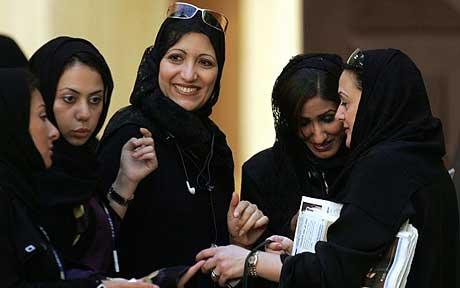
Saudi Arabia is planning to build a new city exclusively for women as it bids to combine strict Sharia law and career minded females, pursuing work
“I’m sure that women can demonstrate their efficiency in many aspects and clarify the industries that best suits their interests, their nature and their ability,” Modon’s deputy director-general, Saleh Al-Rasheed, told Saudi daily newspaper al-Eqtisadiah.
Saudi’s existing industrial cities already have factories owned by women, as well as companies that employ a small portion of the female population and Saleh Al-Rasheed added: “We are now working on a second industrial city for women.
“We have plans to establish a number of women-only industries in various parts of the kingdom.”
As part of a mass overhaul of its workforce and its bid to get women into work the state is also attempting to replace foreign salespeople with Saudi women.
This summer, women started replacing staff in cosmetics and perfume shops, only half a year after they replaced male sales staff in lingerie stores.
But despite some progress, women’s rights in Saudi Arabia are still defined by Islam and lack basic freedoms found in many Western cultures.
Last September, King Abdullah announced that women will be able to vote and run in the 2015 local elections but Saudi Arabia is still the only country in the world that prohibits women from driving and it took huge efforts from the International Olympic Committee to persuade them to enter women in the Games for the first time ever.
Wojdan Shaherkani’s Olympics lasted just over a minute, but the fact she made it to her judo bout with Puerto Rico’s Melissa Mojica meant it was a revolutionary moment for the women of Saudi Arabia.
The country’s ultra-conservative clergy tried to destroy her ambitions to be Saudi’s first female Olympian, before an argument about the type of headscarf she should wear jeopardized her place at the eleventh hour.
The Games in London were also a first for Afghanistan, also bound by strict law, when Tahmina Kohistani ran in the 100m, despite months of harassment from men who believed she should not be allowed to compete.
SHARIA LAW: HOW IT WORKS IN SOME ISLAMIC STATES
Sharia Law is the moral code and religious law of Islam dealing with crime, politics, and economics, as well as personal matters such as sexual intercourse, hygiene, diet, prayer, and fasting.
In general Sharia doesn’t guarantee equal rights for women and men.
For many it does but for rights including marital and inheritance laws, it doesn’t.
Married women have the right to seek employment although it is often thought in patriarchal societies that the woman’s role as a wife and mother should have first priority.
Islam allows both single and married women to own property and the right to inherit from other family members but a woman’s inheritance is different from a man’s, for instance, a daughter’s inheritance is usually half that of her brother’s.
Islamic jurists have traditionally held that Muslim women may enter into marriage with only Muslim men, while the Quran allows a Muslim man to marry a chaste woman from the People of the Book, a term that includes Jews and Christians.
In 2003, a Malaysian court ruled that, under Sharia law, a man may divorce his wife via text messaging as long as the message was clear and unequivocal.
Saudi Arabia has decided to allow its women athletes to compete in the Olympic Games for the first time.
A statement from the Saudi Embassy in London says the country’s Olympic Committee will “oversee participation of women athletes who can qualify”.
The decision will end recent speculation as to whether the entire Saudi team could have been disqualified on grounds of gender discrimination.
The public participation of women in sport is still fiercely opposed by many Saudi religious conservatives.
There is almost no public tradition of women participating in sport in the country.
Saudi officials say that with the Games now just a few weeks away, the only female competitor at Olympic standard is showjumper Dalma Rushdi Malhas.
But they added that there may be scope for others to compete and that if successful they would be dressed “to preserve their dignity”.

Saudi Arabia has decided to allow its women athletes to compete in the Olympic Games for the first time
In practice this is likely to mean modest, loose-fitting garments and “a sports hijab”, a scarf covering the hair but not the face.
For the desert kingdom, the decision to allow women to compete in the Olympics is a huge step, overturning deep-rooted opposition from those opposed to any public role for women.
As recently as April, the indications were that Saudi Arabia’s rulers would accede to the sensitivities of the religious conservatives and maintain the ban on allowing women to take part.
But for the past six weeks there have been intense, behind-the-scenes discussions led by King Abdullah, who has long been pushing for women to play a more active role in Saudi society.
In secret meetings in Jeddah, officials say a consensus was reached in mid-June between the king, the crown prince, the foreign minister, the leading religious cleric, the grand mufti and others, to overturn the ban.
An announcement was ready to be made but then had to be delayed as the country marked the sudden death of Crown Prince Nayef.
“It’s very sensitive,” said a senior Saudi official.
“King Abdullah is trying to initiate reform in a subtle way, by finding the right balance between going too fast or too slow.
“For example, he allowed the participation of women in the Shura council [an advisory body] so the Olympic decision is part of an ongoing process, it’s not isolated.”
The official acknowledged that to refuse to let women take part would have looked bad on the international stage.
“Partly because of the mounting criticism we woke up and realized we had to deal with this. We believe Saudi society will accept this,” the official said.
It is not the first time a Saudi monarch has backed a controversial reform against domestic opposition.
King Faisal, who introduced television in the 1960s and was eventually assassinated, insisted on introducing education for girls.
Today, Saudi women graduates outnumber their male counterparts.
Saudi Arabia has decided to shut its embassy and consulates in Egypt following protests over Egyptian lawyer Ahmed al-Gizawi, who has been detained in Saudi Arabia.
The Saudi ambassador to Egypt had also been recalled, according to the Saudi state news agency.
Egyptian protesters have demanded the release of human rights lawyer Ahmed al-Gizawi.
The head of Egypt’s ruling military council has expressed surprise over the Saudi move.
Field Marshal Hussein Tantawi contacted the Saudi government on Saturday to try to resolve the issue, the Egyptian Mena news agency reported.
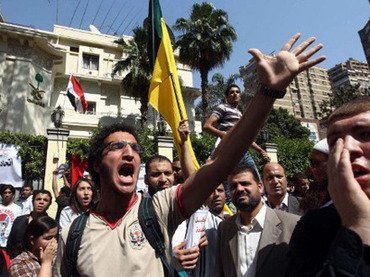
Saudi Arabia shuts its embassy in Egypt following protests over lawyer Ahmed al-Gizawi, who is detained in Saudi Arabia
The Saudi closures affect the embassy in Cairo as well as consulates in the cities of Alexandria and Suez.
The Saudi action marks a sharp escalation of a row that has been going on for some days.
Ahmed al-Gizawi was detained earlier this month on arrival in Saudi Arabia and accused of insulting King Abdullah.
Egyptian activists say he was held after lodging a complaint against Saudi Arabia for its treatment of Egyptians in its prisons.
His family says he had gone to perform a minor pilgrimage – a detail which has angered many Egyptians who feel resentment at the kingdom’s treatment of Egyptians.
But Saudi authorities say Ahmed al-Gizawi was found by airport officials to be carrying drugs – allegedly more than 20,000 anti-anxiety pills – in his luggage.
They doubt Ahmed al- Gizawi was on a pilgrimage, as they say he was not wearing white pilgrims’ clothes.
Observers say it is the worst diplomatic falling-out between the two regional powers since Saudi Arabia severed ties after Egypt signed a peace deal with Israel in 1979.
Many Egyptians work in Saudi Arabia and there have often been cases where they say they have been mistreated under Saudi law.
It has emerged that barbaric textbooks which were handed out in Saudi Arabian schools teach children how to cut off a thief’s hands and feet under Sharia law.
The shocking books, paid for and printed by the Saudi government, also tell teenagers that Jews need to be exterminated and homosexuals should be “put to death”.
Recent editions were obtained by the Institute for Gulf Affairs in Washington, D.C., which says they should raise fears in the West over the use of jihadist language.
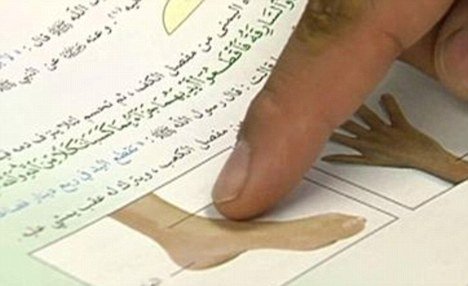
Barbaric textbooks which were handed out in Saudi Arabian schools teach children how to cut off a thief's hands and feet under Sharia law
The books were published and handed out to 9th and 10th-graders despite Saudi Arabia’s promises to clean up textbooks in the kingdom.
Ali Al-Ahmed, director of the Institute for Gulf Affairs, told Fox News: “This is where terrorism starts, in the education system.
“They show students how to cut (the) hand and the feet of a thief.”
The textbooks were printed for the 2010-2011 academic year and translated from Arabic by the institute.
In one, for ninth-graders, students are taught the annihilation of the Jewish people is imperative.
One text reads in part: “The hour (of judgment) will not come until the Muslims fight the Jews and kill them. There is a Jew behind me come and kill him.”
According to the translations, women are described as weak and irresponsible.
Ali Al-Ahmed said the textbooks also call for homosexuals to be put to death “because they pose a danger at society, as the Saudi school books teaches”.
“If you teach six million children in these important years of their lives, if you install that in their brain, no wonder we have so many Saudi suicide bombers.”
The Saudi Embassy in Washington D.C. was approached for comment, but there was no immediate response.
A Sudanese man was publicly beheaded last month in Saudi Arabia for being a “sorcerer”, as is shown in a shocking video.
Abdul Hamid Bin Hussain Bin Moustafa al-Fakki, who was crouched on his knees and blindfolded was executed in a car park Medina, in the west of the country, as dozens looked on.
The shocking video shows the executioner lining his sword up on the back of Abdul Hamid’s neck, before one swift stroke decapitates him.

Abdul Hamid, a Sudanese man was publicly beheaded last month in Saudi Arabia in a car parking for being a "sorcerer"
Abdul Hamid Bin Hussain Bin Moustafa al-Fakki, who was killed on September 20, is believed to have been the 44th person executed in Saudi Arabia this year – and the 11th foreign national.
This year, a total of 17 people were executed in Saudi Arabia, which is more than for the whole of 2010.
Lebanese TV host Ali Hussain Sibat, who was sentenced to death over making predictions of the future on his show, had been scheduled to be beheaded on Friday.
Ali Hussain Sibat’s attorney May El Khansa said the execution did not take place on that day – but that did not mean he has been given a reprieve.
The alarming rise in the number of executions in Saudi Arabia has led to criticism from a number of human rights charities.
It is said that Saudis prefer beheading by a sharp sword, as they think it more humane and quicker than electrocution and lethal injection.
The crime of “sorcery” is undefined in Saudi Arabian law, but it has been used to punish people for the legitimate exercise of their human rights.
The Sudanese man, Abdul Hamid is understood to have been arrested in 2005 after he was entrapped by a man working for the Mutawa’een (religious police).
Abdul Hamid was asked to concoct a spell that would cause the officer’s father to leave his second wife.
According to the officer’s account the Sudanese agreed to carry out the curse in exchange for 6,000 Saudi Arabian riyals (approximately $1,500).
Abdul Hamid was beaten after his arrest and thought to have been forced to admit to acts of sorcery.
In a secret trial, where Abdul Hamid was not allowed legal representation, he was sentenced to death by the General Court in Medina in March 2007.
Few details are available about Abdul Hamid’s trial but he is reported to have been tried behind closed doors and without legal representation.
At the time of Abdul Hamid’s arrest, English language daily The Saudi Gazette ran an article entitled Magic Maids which said that “we must face up to the threats from some maids and servants and their satanic games of witchcraft and sorcery, their robbery, murder, entrapment of husbands, corruption of children and other countless stories of crime that have been highlighted by both experts and victims of these crimes”.
Malcolm Smart, Amnesty International’s Director for the Middle East and North Africa, heavily criticized the killing.
“Abdul Hamid’s execution is appalling as is Saudi Arabia’s continuing use of this most cruel and extreme penalty.
“That he should have been executed without having committed anything that would appear to constitute a crime is yet another deeply upsetting example of why the Saudi Arabian government should immediately cease executions and take steps to abolish the death penalty.”
Amnesty International had campaigned on Abdul Hamid’s behalf following his arrest and had urged Saudi Arabia’s King Abdullah to prevent his execution.
But the campaign has been to no avail, and since the end of the holy month of Ramadan a few weeks ago, the Saudi Arabian authorities have resumed executions at an alarming pace.
Amnesty International said that seven people have been executed since the killings resumed on September 5.
Currently, 140 prisoners are believed to be facing the death penalty in Saudi Arabia, which was one of a minority of states that voted against a United Nations general assembly resolution calling for the worldwide moratorium on executions on December 2010.
Warning: video has graphic content!
[youtube oXSYg7ktvpE]
 Prev123Page 3 of 3
Prev123Page 3 of 3

















